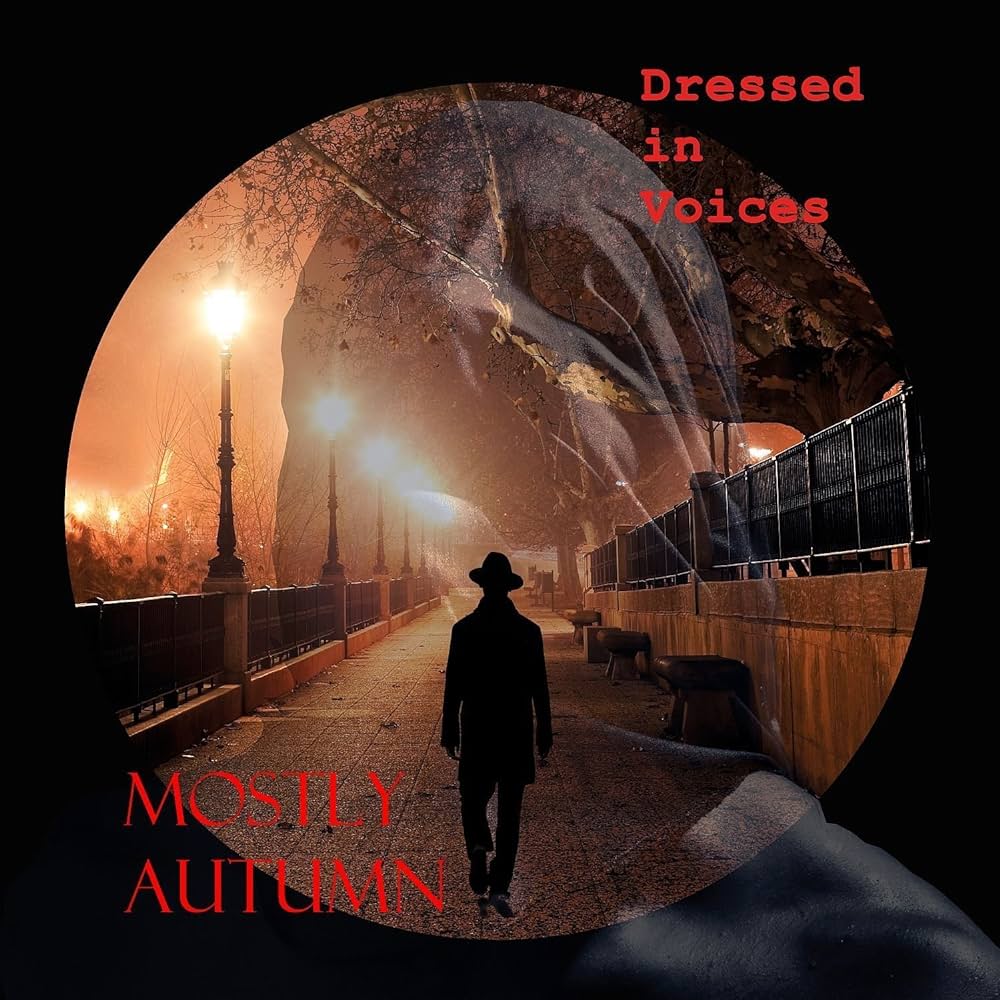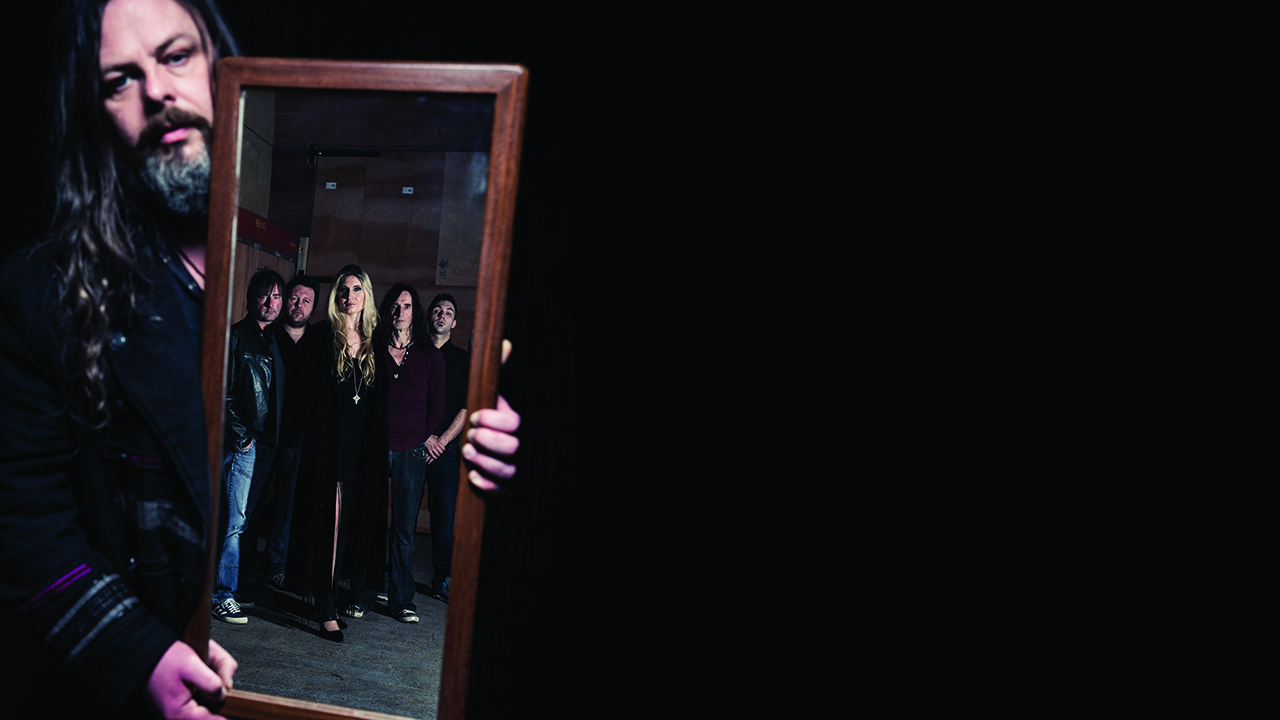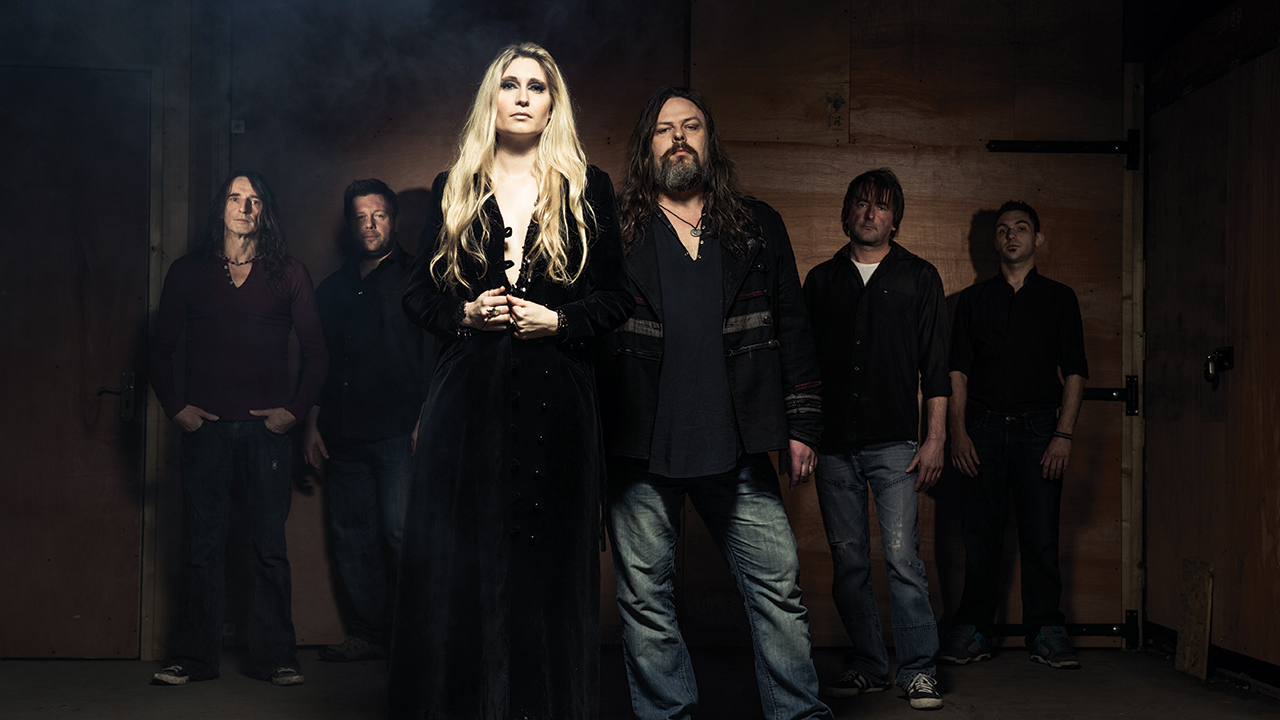Happy newlyweds Bryan Josh and Olivia Sparnenn of Mostly Autumn decamped to the beautiful Lake District to enjoy the stunning countryside, relax – and write Dressed In Voices, a harrowing concept album about murder, death and loss. In 2014 they told Prog all about it...
Bryan Josh doesn’t seem a likely candidate for harrowing, morbid storytelling. He’s far too much of a genial, beardy gent, surely. With Mostly Autumn, his band of nearly 20 years, he’s developed a nostalgic, lovingly crafted catalogue of folk-infused progressive rock, with themes of life and nature at their heart. “And the weather!” he adds cheerfully, speaking to Prog on one of his rare days off.
But with their 11th studio record, Dressed In Voices, the theme of death came surprisingly naturally. So much so, that after the spontaneous creation of the first album track, Josh felt compelled to develop a concept LP from it.
The finished album uncompromisingly explores the notion of cold-blooded murder, and the full impact it generates – from the prettily eerie, emotional Saturday Night (depicting the sudden, unsuspected act of murder itself), through life memories in the likes of Skin On Skin, to a beautiful, bittersweet look at mortality and life closure in Box Of Tears.
“I just went to the piano and sang it in one take,” he remembers of the first burst that inspired him to pursue a full-on concept album at this established stage in his career. “Something must have been whirring up there, subconsciously. When you see some of the things that happen in places such as Kenya – people going around murdering people – and it happens all the time. A good friend of my wife, my wife’s sister’s friend, got murdered in York the day after I’d written that song. It strengthened the sadness of it all.”
Poetic and full of character, Dressed In Voices is recognisably a Mostly Autumn album. But it’s quite a departure from the naturalistic themes of their previous work – and certainly from the earlier, more delicate likes of For All We Shared. Following on from 2012’s The Ghost Moon Orchestra, the new album builds on the Pink Floyd touches that have long infused their music, generating grander, higher-reaching soundscapes. The songs are made more potent by exploring the theme of murder and its full effect, rather than looking at one individual set of characters.
“The idea is that anybody could put themselves in that situation, and imagine how it would be for their loved ones and everyone around them,” Josh explains. “The album just expands that second just as the killing is about to happen, speaking to the killer almost: if you’re going to kill someone, you should feel it all. See what you’ve done, all of it.”

The initial writing took place in Josh’s sister’s converted barn in Skipton, before he and vocalist Olivia Sparnenn holed themselves up in a 600-year-old pad in the Lake District for most of January. Creative writing sessions took place in front of roaring log fires, or in the kitchen.
“There’s never a conscious decision to do this, that or the other,” he says. “Which is probably why most of our songs happen really quickly.”
It was strange though, Josh agrees, thrashing out this gritty concept in such a beautiful, peaceful place – a harrowing undertaking, especially for someone just recently married (to Sparnenn, who took over from long-time Mostly Autumn singer Heather Findlay in 2010).
“The best thing about working in that kind of environment is that it really clears your mind,” Josh says of the Lake District. “You’re more open to letting the ideas come through you. The flow comes much easier, even with this hard-hitting subject matter. But, yeah, the beauty of being there was fantastic, but doing the album… it was torturous at times. A lot of times we’d wake up in the morning and say, ‘Should we just do a bunch of songs?’
“I had many nights thinking, ‘Should I be doing this? Is it a bit too dark? Too close to the bone?’” he adds. “It was incredibly sad, but it brought up some strangely uplifting moments as well, among it all. It’s honest and it’s real. It’s like nothing we’ve ever done before.”
Those more uplifting moments can be heard in tracks such as Down By The River, which taps into carefree, youthful experiences in pretty, natural surroundings. Josh very much credits the Lakes with bringing out this lighter, more organic 70s vibe in the album’s middle section.
However, alongside this, the album’s majestic narrative echoes one of Josh’s inspirations, specifically Pink Floyd’s gargantuan concept album The Wall.
“There are parts of this album where I wish we could have used a full philharmonic orchestra – it could have really brought some conceptual moments out,” he admits. “With First Day At School, for example, it turned into this moment of the beauty of a five-year-old starting school, going into monster-under-the-bed kind of scenarios, maybe the killer lurking round the corner…”
Could it be quite the pyro’n’projections rock opera if resources allowed?
“I’d absolutely go to town,” he enthuses, “telling the story through projections, possibly get people to play parts here and there on stage – make it a full-blown rock opera. I could imagine grand images and lights, maybe a big bonfire in Down By The River…”
For Mostly Autumn, their experience and independence are such that they probably could set up a bonfire onstage if they wanted to – and if health and safety, and venue owners, allowed.
Releasing records through their own label, Mostly Autumn Records (before sending them to distributors), they straddle the DIY and ‘official industry’ worlds in a way that secures them artistic freedom and an air of slick professionalism, after having built up a loyal following from scratch.
“We have also been offered deals by some pretty big record companies,” reveals Josh. “But it’s a very difficult point when you’re in control, and then you hand it over and suddenly you lose some of that control. Financially, it can be very precarious. I really feel for other bands trying to get deals now, because it doesn’t seem to happen the way it did in the 70s, where you’d get that long-term investment in a project.”

Still, seemingly unperturbed by the kind of problems faced by myriad 21st-century acts, Josh appears to be in a happy place – in no small part thanks to his marriage to Sparnenn. “It’s great!” he says of being in a band with his wife. “There haven’t been any negatives so far. We get on really well as people. In some ways it’s better because we can work together easier.”
Mostly Autumn played a celebration concert the night after their wedding in 2013. After which, it was straight to Holland for more gigs, then writing for the new album. Such a schedule doesn’t bode well for honeymoon plans, though they do now have a trip to Turkey arranged for June. “We’ll try our best to chill out on that one,” he laughs.
There’s something almost philosophical about Josh’s passionate but easy attitude to music, and that’s reflected in the continually fluid cast of Mostly Autumn. Sparnenn went from backing vocalist to taking over from Heather Findlay, and Alex Cromarty has now joined the band on drums.
Meanwhile, Mostly Autumn and Karnataka (a band that’s been home to several ex-Mostly Autumn players) alumni Anne-Marie Helder and Gavin Griffiths have also committed to Panic Room.
“I’ve seen it as more of a spiritual force that’s gonna move on,” Josh reasons. “And it’ll move on regardless of who comes and who goes. And the problem at our level is that other people have commitments, which does make it difficult, so you have to kind of build a squad up really. But you do feed off people, particularly playing live.
“I’d always say you’d liken Mostly Autumn to The Alan Parsons Project, rather than a unit like Led Zeppelin or whoever,” he adds. “It is like a force, a life force constantly changing, and that’s probably reflected in a lot of the songs being about nature, life and weather. Of course, there is a core of myself, and Iain [Jennings, keyboards, formerly also with prog rockers Breathing Space], when we’re working with him, and the rest of it does kind of, well, rotate. People do come and go, and you can’t rely on them always being there because they have their own lives and other projects.”
Not that this is major worry – Josh is adamant that there’s never been any animosity between them (“We’re honestly more like a family!”). Members come and go, Jennings continues his day job as a teacher, but Mostly Autumn continue to naturally, contentedly evolve.
Josh’s infatuation with nature, and the Lakes especially, stems from early camping and climbing trips with his father. In fact, most of his real ‘eureka’ moments as a songwriter have taken place there. Popular numbers such as Heroes Never Die, for instance, were mostly written in the Lakes. And hearing Josh reminisce on good times there – with friends, campfires and guitars – the organic, free-spirited nature of Mostly Autumn suddenly makes an awful lot of sense.
“Its like Middle Earth there, there’s just a magic about the place. I love other places, like Scotland and some lovely spots in Yorkshire and Wales. But for me, there’s something very spiritually special about the Lake District. It’s like walking on magic earth – when you’re there, you just feel it. There are always places down by the river to have fires under the stars…” he breaks off, then adds, smiling: “I don’t know, it’s a wonderful place.”

